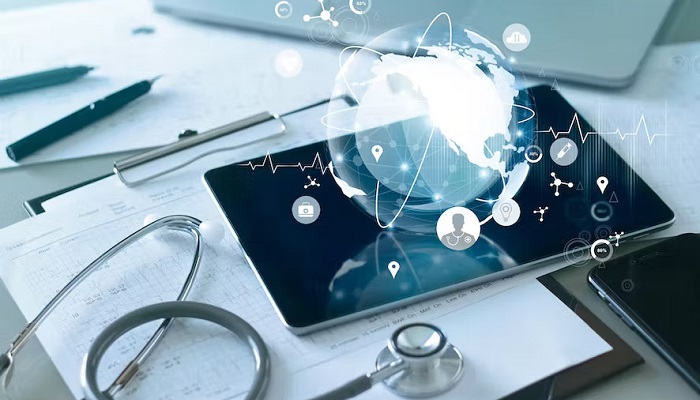Governments across South East Asia are accelerating digital health plans to connect and integrate healthcare data. But in the meantime, new technology like machine learning can help patients and their providers break data silos to better manage their care.
As a Singapore-based physician and chronic disease warrior with three autoimmune disorders, I have first-hand experience of the challenges that fragmented and disconnected data poses to us all.
Healthcare produces about 30% of the world’s data, a share that’s poised to outpace other industries as the Internet of medical things and wearable devices proliferate. Tremendous promise lies within the data each and every one of us generates and which five years ago broke through 80 megabytes a year.
But disparate, unstandardised data and siloed systems makes it difficult to share important health information.
As a patient, I receive multiple digital and non-digital data sources of my health data in various formats, with some of my digital data housed across several applications. To monitor my health and coordinate care, I spend a lot of time manually gathering, analysing, and sharing this information across different healthcare providers. This adds additional stress to my disease burden. And sadly, I am not alone. Patients often find themselves without easy access to the insights that could improve their care and their lives.
The need to connect fragmented data — including mine — inspired me to start Jonda Health, a health tech platform. At Jonda Health, we are building a technology stack to help open the doors for data silos, regulate data flow, and use the right ‘valves’ to direct data to the right place where and when it is needed. Our technology stack comprises of several modules to deal with analogue data, multiple data standards, lack of system interoperability and data privacy regulations.We have deployed our existing technology to a patient-facing application called Jonda which empowers people to securely and conveniently access, manage and benefit from their own health-related data, including the right to assign these privileges to others. In addition, access to real-world data, including patient-generated information, can advance clinical research and foster innovation.
Digital data management solutions help patients to focus on what matters most: Getting and staying well while contributing to research if they so choose.
The cost of inaccessible data to patients
A decade ago, researchers analysed how much time patients and informal caregivers spend managing chronic diseases. The finding was astounding: Two hours or more daily.
When data is inaccessible, things get even worse. Missing forms and duplicated clinical work contribute to hundreds of billions of dollars in healthcare annually. Then there are the wages patients lose when they leave work to deal with data headaches and redundant appointments.
But for patients, all this is secondary to the emotional pain and frustration. Messy, inaccessible data only increases patient and provider burden and complicates care.
A better path forward begins with designing and building clinical data-management apps that put patients’ needs first. Consumers want secure tools that are and adept at uniting disparate data, irrespective of provider or geography.
Applications need to be easy to use and provide data in a visually comprehensible format, such as time series graphs for relevant biomarkers. This not only helps to improve patient’s understanding but also makes clinicians’ lives easier. When patients can use layperson’s terms to simply retrieve data with little effort, everyone wins.
Machine learning algorithms to extract data
When health data is digital, it’s often available only as a scanned PDF file. In addition, a fair amount of data is still not digitised today.
To address this, we developed technology to digitise analogue health information. Our machine learning algorithm can classify types of document and extract, structure and standardise the unstructured data from certain document types, such as blood tests. This technology deployed in our patient facing app enables patients to upload any document or photo that they deem relevant to their health management.
The document or photo will automatically be categorised, and blood biomarkers will be presented in a way patients can understand. From there, in a few finger taps, they can share it easily and securely with their providers.
Many of us hold privacy concerns about our health data and its use in applications. This is not surprising given the growing number of healthcare data breaches. A single health data record can cost $250 on the black market, far exceeding the $5 that buyers pay for a credit card number.
Security by default with zero knowledge encryption
Data privacy and security is at the heart of everything that we do. We believe that it is a fundamental human right. That’s why we not only use cryptographic end-to-end security but also zero knowledge encryption. In our patient facing application, this ensures that only patients can decrypt their data, giving them full control of their health information.
Given we are dealing with large amounts of unstructured data, we require massive processing capabilities. As such, we are incredibly thankful to have InterSystems as a partner to help fulfil our mission. Jonda Health leverages the InterSystems IRIS® data platform to provide the scale, speed and power we need.
The ability to share data securely without hassle is key to creating the frictionless consumer experience that patients deserve and healthcare organisations must achieve. This also promises to eliminate treatment delays, unnecessary testing, and wasted time and money.
As a user of our patient facing application myself, I have found it incredibly useful in managing my own health. For example, by merging data from different providers, the app helped me identify a trend that pointed to a larger issue. I shared the necessary data easily with my care team, who delivered the appropriate treatment in a timely manner.
Every patient deserves to have easy access to their health data and to be able to share it securely with their healthcare providers to be a full participant in the management of their own care. With new technology, that vision is rapidly becoming a reality.




















